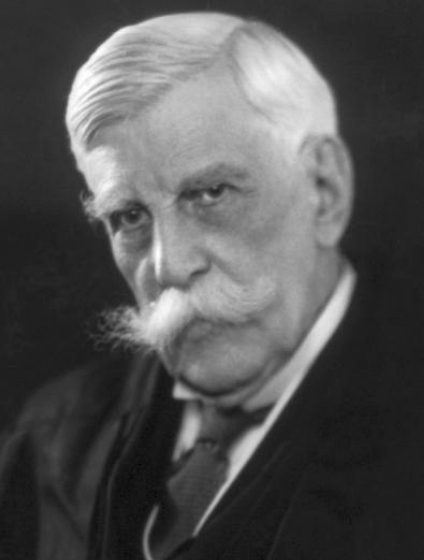On this date in 1841, jurist Oliver Wendell Holmes Jr., was born in Boston. He was the namesake and son of a famed physician. Holmes graduated from Harvard in 1861 and immediately enlisted in the U.S. Army, where he was seriously wounded three times. After the Civil War he entered Harvard Law School, where his best friend was William James.
Holmes’ New York Times obituary noted that the two young men went to Europe together, “while James went on, continuing in Germany his search for the meanings of the universe, Holmes decided that ‘maybe the universe is too great a swell to have a meaning,’ that his task was to ‘make his own universe livable,’ and he dove deep into the study of the law.”
Holmes was admitted to the bar in 1866. He became coeditor of the American Law Review in 1870. Holmes wrote his legal treatise, The Common Law, in 1881, a 15-year labor. His recodification of the law from religious foundations to modern jurisprudence was pivotal to the evolution of legal scholarship. Holmes urged “judicial restraint,” or the divorcing of private views from legal opinions.
While he was a professor at Harvard Law School, he was appointed at age 41 as an associate justice on the Massachusetts Supreme Court, eventually becoming chief justice. Theodore Roosevelt appointed him to the U.S. Supreme Court in 1902. He retired in 1932 as the oldest judge (age 91) to serve. Holmes earned the sobriquet “The Great Dissenter” for his many famous dissents, some of which have long since been adopted as mainstream by courts.
Among his well-known legal adages: “The mind of the bigot is like the pupil of the eye: the more light you shine on it, the more it will contract.” “Taxes are the price we pay for a civilized society.” “Three generations of imbeciles are enough.” “The most stringent protection of free speech would not protect a man in falsely shouting fire in a theater.” “The right to swing my fist ends where the other man’s nose begins.” Holmes, like his father, was a Unitarian, who believed in a god but was creedless.
He was married to Fanny Bowditch Dixwell from 1872 until her death in 1929. They never had children but raised an orphaned cousin. He died of pneumonia in 1935, two days short of his 94th birthday. He left his estate to the U.S. government.


